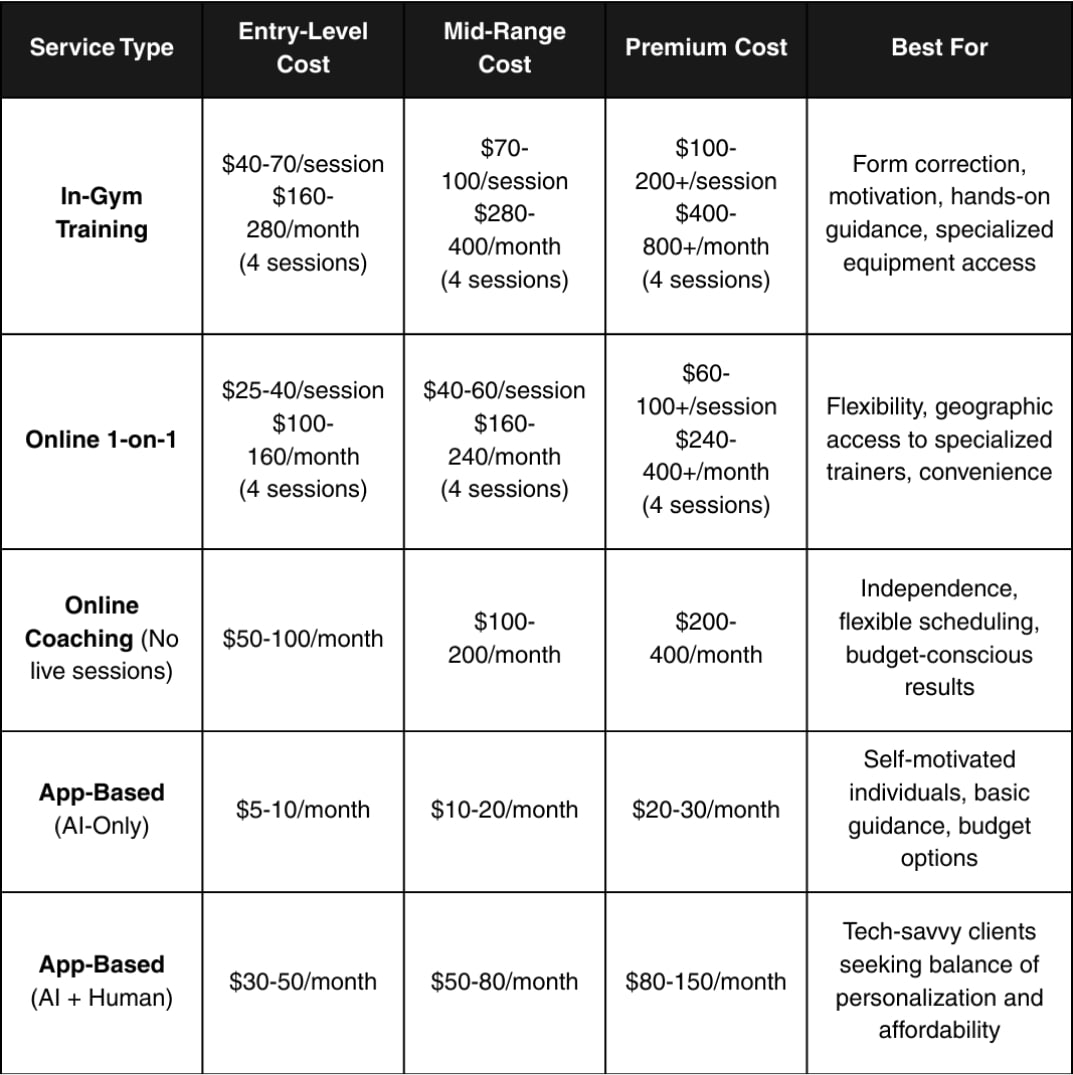In this health-conscious world, hiring a personal trainer and investing in personal fitness has become more critical than ever. Whether you’re just starting your fitness journey or looking to elevate your workouts, understanding the cost of a personal trainer is crucial for making informed decisions about your health investment.
As we navigate 2026, the fitness industry continues to evolve in response to technological advancements, shifting economic landscapes, and changing consumer preferences. Personal training is no longer limited to traditional gym settings; now, you can access expert guidance through online platforms and mobile applications. This diversity in options has created a wide range of pricing structures, including the fees charged by personal trainers, which can be confusing to navigate.
But why does knowing the cost of a personal trainer matter? Simply put, it helps you:
- Set realistic budget expectations for your fitness goals
- Understand the value you receive for different price points
- Make informed comparisons between traditional, online, and app-based training
- Avoid overpaying for services that don’t align with your needs
- Plan your fitness journey with financial confidence
In this comprehensive guide, we’ll break down the various costs associated with personalized training packages across different platforms in 2026. Whether you’re considering in-gym sessions, online coaching, or app-based training, you’ll gain clarity on what to expect financially and how to maximize your investment in your health and fitness.
Average Personal Trainer Costs in 2026
Before diving into the specifics, let’s take a bird’s-eye view of what you can expect to pay for personal training services in 2026:
In-Gym Personal Training:
- Single session: $40-$150+ per hour
- Monthly packages: $250-$400 on average
- Premium trainers in major cities: Up to $200+ per session
Online Personal Training:
- One-on-one virtual sessions: $25-$75 per session
- Monthly coaching packages: $100-$300
- Custom programming without live sessions: $50-$150 per month
App-Based Training:
- Subscription-based apps: $10-$30 per month
- Hybrid apps (AI + human coach): $30-$80 per month
- Premium personalized app coaching: $80-$150 per month
These figures represent national averages and can vary significantly depending on factors such as location, trainer experience, and the specific services included. Now, let’s explore each option in greater detail to help you understand what influences these costs and what value you can expect.
In-Gym Personal Training
Cost per Session and per Month
When it comes to traditional personal training in-gym, you’re paying not just for expertise but also for the face-to-face interaction and hands-on guidance that many find invaluable.
Single Session Pricing:
- Entry-level certified trainers: $40-$70 per hour
- Mid-level experienced trainers: $70-$100 per hour
- Elite or specialized trainers: $100-$150+ per hour
Most gyms and trainers offer package deals that reduce the per-session cost when you commit to multiple sessions. In 2026, these packages typically look like:
Package Pricing:
- 4 sessions per month: $160-$560 (average $50-$140 per session)
- 8 sessions per month: $300-$960 (average $37.50-$120 per session)
- 12 sessions per month: $420-$1,320 (average $35-$110 per session)
Many trainers also offer semi-private training (2-3 clients simultaneously), which costs approximately $30-$60 per person per session, making it a more affordable option while still providing personalized workout programs and attention.
What Affects Pricing (Location, Certifications, Gym Chains, etc.)
Several factors influence how much a personal trainer costs in a traditional gym setting:
Geographic Location:
Location remains one of the most significant factors affecting how much does a personal trainer cost in 2026. In major metropolitan areas like New York City, Los Angeles, or San Francisco, expect to pay on the higher end of the spectrum, sometimes exceeding $150 per session. In contrast, the same level of training might cost $30-$50 in smaller cities or rural areas.
Trainer Qualifications and Experience:
The more credentials and experience a trainer has, the higher their rates will be:
- Newly certified trainers might charge lower rates to build their client base
- Trainers with 5+ years of experience and proven results command higher fees
- Those with advanced certifications (NASM, ACE, CSCS) or specialized training (corrective exercise, sports nutrition, pre/post-natal) justify premium rates
- Trainers with degrees in exercise science or related fields often charge more
Gym Type:
Where your trainer works significantly impacts their pricing:
- Budget gym chains: $30-$60 per session
- Mid-range fitness centers: $50-$90 per session
- Luxury fitness clubs: $90-$200+ per session
- Private studios: $70-$150 per session
- Independent trainers (who come to your home): $60-$120 plus travel fees
Additional Services:
Many trainers now offer comprehensive packages that include:
- Nutritional guidance and meal planning
- Body composition assessments
- Custom workout plans for non-training days
- Text/email support between sessions
- Progress tracking apps and technology
These additional services, including a comprehensive coaching program, can increase the overall cost but often provide better value and results, especially for those serious about their fitness goals.
Online Personal Trainers
The online personal training market is expected to mature significantly by 2026, offering sophisticated options that rival in-person experiences for many fitness enthusiasts.
Virtual 1-on-1 Training
Virtual one-on-one training sessions connect you with a personal trainer through video platforms. These live sessions provide real-time feedback, form corrections, and personalized guidance, offering a similar experience to in-person training without geographical limitations.
Cost Structure:
- Single sessions: $25-$75 per hour
- Package of 4 sessions: $90-$280 ($22.50-$70 per session)
- Package of 8 sessions: $160-$520 ($20-$65 per session)
- Package of 12 sessions: $220-$720 ($18.30-$60 per session)
The lower price point compared to in-gym training reflects reduced overhead costs for trainers, not necessarily lower quality. Many top-tier trainers have shifted partially or entirely to online coaching to better cater to diverse fitness goals, making premium expertise more accessible.
Personalized Coaching
Beyond live sessions, many online trainers offer comprehensive coaching packages that include:
Typical Components:
- Custom workout programming is updated weekly or monthly
- Video libraries demonstrating proper exercise technique
- Nutrition guidance and meal planning
- Regular check-ins via text, email, or video call
- Progress tracking through dedicated apps
- Community support through private groups
Cost Range:
- Basic programming (workouts only): $50-$150 per month
- Standard coaching (workouts + limited support): $100-$250 per month
- Premium coaching (workouts + nutrition + unlimited support): $200-$400 per month
Pricing Models (Subscription, Monthly, Session-wise)
Online personal training offers flexible pricing models to suit different preferences:
Subscription-Based:
- Monthly recurring payment
- Usually provides the best value for consistent training
- Often includes ongoing program adjustments and support
- Price range: $100-$300 per month
Pay-Per-Program:
- One-time payment for a set program (4, 6, or 12 weeks)
- Limited or no ongoing adjustments
- Price range: $50-$1,000 depending on program length and customization
Hybrid Models:
- Combination of live sessions and ongoing programming
- Flexibility to adjust session frequency based on needs and budget
- Price range: $150-$350 per month
Online personal training has become particularly popular among clients with specific goals, such as weight loss, muscle building, or sports training, as it enables them to work with specialized coaches and receive a customized workout plan regardless of location something many trainers now deliver efficiently using fitness studio software like FitBudd to manage programming, communication, and progress tracking in one place.
Personal Training Apps
The personal training app market has exploded by 2026, with technology bridging the gap between AI-driven workouts and virtual training with human coaching.
App-based Coaching (AI + Real Trainers)
Modern fitness apps now offer sophisticated hybrid models that combine the convenience and affordability of technology with the expertise of human trainers.
Types of App-Based Training:
- AI-Only Apps: Algorithm-generated workouts based on your goals, equipment, and fitness level
- AI with Human Oversight: Primarily algorithm-driven but with periodic human review and adjustments
- Human-Led with AI Support: Custom programming from real trainers, supported by AI for tracking, form checking, and daily adjustments
Cost Structure:
- AI-Only Apps: $5-$20 per month
- AI with Human Oversight: $20-$50 per month
- Human-Led with AI Support: $50-$150 per month
Low-Cost Alternatives
App-based training provides several budget-friendly options:
Group Challenges:
- Guided group programs with hundreds or thousands of participants
- Fixed start and end dates with structured progressions
- Community support and accountability
- Price range: $20-$100 per challenge (typically 4-8 weeks)
Freemium Models:
- Basic features available for free
- Premium features (custom programming, trainer access) behind a paywall
- Price range: Free to $15 per month for premium features
Content-Based Apps:
- Library of pre-recorded workouts and programs
- Minimal personalization but extensive variety
- Price range: $10-$25 per month
Price Range and Benefits
App-based training offers unique advantages that justify its place in the market:
Accessibility Benefits:
- 24/7 access to workouts and guidance
- No scheduling constraints
- Location independence
- Immediate feedback through technology
- Progress tracking and data analysis
Cost-Effectiveness:
- Entry-level: $5-$15 per month
- Mid-range: $15-$50 per month
- Premium: $50-$150 per month
The primary trade-off is the reduced human touch and personalization compared to traditional or online personal training. However, for many clients—especially those with some fitness experience—these apps provide an excellent balance of guidance, affordability, and convenience.
Cost Comparison Table: Gym vs. Online vs. App
To help you visualize the differences, here’s a comprehensive comparison of personal trainer costs across platforms in 2026

This comparison highlights the significant cost differences across platforms, with traditional in-gym training being the most expensive and AI-only apps being the most affordable option.
Factors That Affect Personal Trainer Pricing
Beyond the platform or delivery method, several factors influence how much you’ll pay for personal training services in 2026.
Trainer Experience and Certifications
The trainer’s qualifications significantly impact their rates:
Certification Level:
- Basic certification (ACE, NASM, ISSA): Baseline pricing
- Multiple certifications: 10-30% price increase
- Specialized certifications (corrective exercise, nutrition, pre/post-natal): 15-40% price increase
- Advanced credentials (CSCS, NSCA-CPT): 20-50% price increase
Experience:
- 0-2 years: Entry-level rates
- 3-5 years: 15-30% higher than entry-level
- 5-10 years: 30-60% higher than entry-level
- 10+ years: 50-100%+ higher than entry-level
Educational Background:
- No degree: Baseline pricing
- Associates/Bachelors in related field: 10-25% price increase
- Master's or higher in exercise science, physiology, or nutrition: 25-50% price increase
Frequency of Sessions
How often you train affects your per-session cost:
Frequency Discounts:
- 1x per week: Standard rate
- 2x per week: 5-15% discount per session
- 3x per week: 10-20% discount per session
- 4x+ per week: 15-25% discount per session
Commitment Length:
- Pay-as-you-go: Highest per-session rate
- 1-month commitment: 5-10% discount
- 3-month commitment: 10-20% discount
- 6-month+ commitment: 15-30% discount
Location and Lifestyle
Geographic and demographic factors play a major role in pricing:
Regional Variations:
- Northeast and West Coast: Highest rates (particularly in major cities)
- Midwest and Southern states: Moderate rates
- Rural areas: Lowest rates
Gym Exclusivity:
- Budget gyms (Planet Fitness, etc.): $30-60 per session
- Mid-tier gyms (LA Fitness, 24 Hour Fitness): $50-90 per session
- Luxury clubs (Equinox, Life Time): $90-200+ per session
- Boutique studios: $70-150 per session
- Private training facilities: $80-200+ per session
Client Demographics:
- Youth/student training: Often discounted 10-30%
- Senior training: Sometimes discounted 5-15%
- Corporate/executive training: Premium rates 10-50% higher
Training Goals (Weight Loss, Bodybuilding, Athletic, etc.)
Your specific fitness objectives can influence pricing:
General Fitness/Weight Loss:
- Standard rates apply
- Often, the most common and competitively priced
Specialized Training:
- Bodybuilding/Physique: 10-30% premium
- Sport-specific training: 15-40% premium
- Medical fitness (post-rehab, clinical conditions): 20-50% premium
- Competition prep: 30-100% premium
Goal Complexity:
- Single-focus goals: Standard rates
- Multiple or complex goals: Higher rates due to more complex programming
Understanding these factors helps explain the wide range in personal trainer pricing and can guide you in finding the right balance between cost and value for your specific situation.
How to Choose a Personal Trainer Based on Budget
Finding the right personal trainer within your budget, whether through one-on-one training or group sessions, requires strategy. Here’s how to approach it based on different budget levels:
Tight Budget ($50-150/month)
If you’re working with limited funds:
Best Options:
- Group training sessions ($15-30 per session)
- App-based training with AI coaching ($10-30/month)
- Online programming without live sessions ($50-150/month)
- Community recreation center trainers ($30-50/session)
- Student trainers at universities ($20-40/session)
Strategy:
- Focus on learning fundamentals through fewer sessions
- Request a custom program you can follow independently
- Consider semi-private training with a friend to split costs
- Use free consultations to get starter advice
Moderate Budget ($150-300/month)
With a mid-range budget:
Best Options:
- In-gym training once weekly ($160-400/month)
- Online coaching with weekly check-ins ($100-250/month)
- Hybrid app coaching with human oversight ($50-150/month)
- Semi-private in-person sessions 2x weekly ($120-300/month)
Strategy:
- Mix one weekly session with independent workouts
- Choose online trainers outside major metropolitan areas
- Look for newer trainers with solid credentials but less experience
- Negotiate package deals for longer commitments
Substantial Budget ($300-600+/month)
With more to invest:
Best Options:
- In-gym training 2- 3x weekly ($320-900/month)
- Premium online coaching with regular video sessions ($250-400/month)
- Specialized trainers for specific goals
- Hybrid approaches (in-person + online support)
Strategy:
- Interview multiple trainers to find the best fit
- Prioritize proven experience with your specific goals
- Look for comprehensive packages including nutrition
- Consider trainers with advanced degrees and multiple certifications
Questions to Ask Potential Trainers:
Regardless of budget, ask these questions to assess value:
- “What certifications and education do you have?”
- “What experience do you have working with clients like me?”
- “How do you track progress and measure results?”
- “What’s included besides the training sessions?”
- “Do you offer any discounts for package purchases?”
- “How do you customize programs for individual needs?”
- “What’s your cancellation and rescheduling policy?”
- “Can I speak with some of your current or former clients?”
Remember that the cheapest option isn’t always the best value. Consider your specific needs, learning style, and motivation factors when making your decision.
Budget-Friendly Alternatives & Tips
Not everyone can afford regular personal training or nutrition coaching, but that doesn’t mean you can’t get expert guidance. Here are cost-effective alternatives:
Semi-Private and Small Group Training
Small Group Personal Training:
- 3-6 people per trainer
- Cost: $20-50 per session
- Benefits: Social motivation, reduced cost, still relatively personalized
- Savings: 40-70% compared to one-on-one training
Semi-Private Training:
- 2-3 people per trainer
- Cost: $30-60 per session
- Benefits: More attention than group classes, cost-sharing
- Savings: 30-50% compared to private training
Periodic Check-ins Instead of Regular Sessions
Assessment-Based Approach:
- Monthly check-in with a trainer ($60-150)
- Custom program to follow independently
- Progress assessment and program adjustments
- Savings: 60-80% compared to weekly sessions
Consultation Packages:
- Package of 4-6 sessions spread over 3-6 months
- Focus on form, technique, and program design
- Self-directed workouts between sessions
- Savings: 50-70% compared to regular training
Free and Low-Cost Resources
Gym-Provided Services:
- Free fitness assessments (offered by many gyms)
- Complimentary program design (often one per membership)
- Member workshops and seminars
Community Resources:
- Recreation center fitness programs ($5-20 per class)
- University exercise science programs (student trainers)
- Non-profit health initiatives
- Workplace wellness programs
DIY Approach with Professional Guidance
Educational Investment:
- One-time program purchase ($50-200)
- Online courses on exercise science ($20-100)
- Books and reference materials
- Free YouTube channels from certified professionals
Tech-Assisted Training:
- Form-checking apps ($5-15/month)
- Workout template sites ($10-20/month)
- Community-based fitness platforms
These alternatives can provide significant value while helping you develop independence and knowledge about your own fitness needs.
Revolutionizing Personal Training Through Technology
Among the many platforms transforming the fitness industry in 2026, FitBudd stands out as an all-in-one solution for both clients and the best personal trainers, including NASM certified personal trainers. This innovative platform allows certified personal trainers to deliver highly personalized coaching through a dedicated app, making quality guidance more accessible and affordable.
How FitBudd Works:
- Trainers create customized workout and nutrition plans through the platform
- Clients access these plans through a branded mobile app
- Real-time tracking, messaging, and progress monitoring keep everyone connected
- Trainers can manage hundreds of clients while maintaining personalization
Over 10,000 fitness professionals have adopted FitBudd to scale their businesses while providing more affordable options to clients. This technology enables trainers to offer tiered service levels:
What’s the Right Investment for You in 2026?
Personal training is ultimately an investment in your health, longevity, and quality of life. When viewed through this lens, defining your personal trainer worth and finding the right trainer at the right price becomes less about finding the cheapest option and more about maximizing your return on investment.
Whether you choose traditional in-gym training, online coaching, app-based guidance, or a combination approach, the key is finding a solution that fits your budget while providing the expertise, motivation, and accountability you need to reach your fitness goals.
In 2026’s diverse fitness landscape, there truly is a personal training option for every budget and goal. By understanding the costs, benefits, and alternatives outlined in this guide, you’re well-equipped to make an informed decision about your fitness investment.
Frequently Asked Questions (FAQs)
1. How much does a personal trainer cost in 2026?
Personal training costs range from $40 to $200+ per session depending on experience, location, and service type. Online or app-based trainers often offer more affordable alternatives.
2. Is hiring a personal trainer worth it for beginners?
Yes! A personal fitness trainer helps set the foundation for your fitness journey, ensuring proper form, motivation, and a customized workout plan based on your fitness level.
3. What’s the difference between group training sessions and one-on-one personal training?
Group training sessions are more budget-friendly and social, while personal training offers customized guidance tailored to your fitness goals and needs.
4. How do I choose between an online personal trainer and a traditional personal trainer at my local gym?
Online training offers flexibility and lower prices, while traditional personal training provides hands-on support. Choose based on your budget, schedule, and learning preference.
5. Do I need a certified personal trainer or fitness coach?
A certified personal trainer or health coach ensures you receive professional, science-based guidance, especially if you have specific goals or need physical therapy support.
6. How many personal training sessions do I need per week?
Most people benefit from 1–3 training sessions weekly depending on their fitness level, goals, and whether they combine sessions with independent workouts.
7. What’s included in personal training costs?
Personal training costs typically cover workout planning, progress tracking, and direct guidance. Premium packages may include nutrition support, messaging, and app access.
8. Can an online personal trainer help with injury recovery or physical therapy needs?
Yes, many experienced trainers and fitness coaches offer virtual training sessions tailored for rehabilitation or mobility, especially those with specialized skills.
9. Are group fitness classes a good alternative to personal training?
Yes, group fitness classes are a fun and affordable alternative for general fitness, though they lack the personalized attention a personal trainer provides.
10. What qualifications should I look for in a personal fitness trainer?
Look for personal training certification from reputable organizations (like NASM, ACE), experience with your goals, and a client-focused approach to workout planning.






%20to%20Become%20a%20Certified%20Personal%20Trainer-min.jpg)





